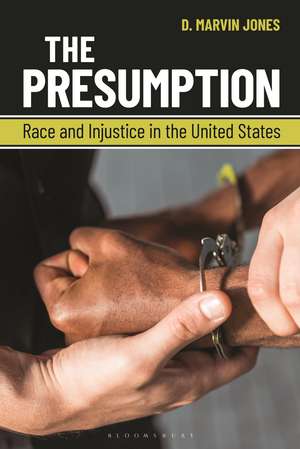The Presumption: Race and Injustice in the United States
Autor D. Marvin Jonesen Limba Engleză Hardback – 29 mai 2024 – vârsta până la 17 ani
Preț: 540.38 lei
Preț vechi: 690.05 lei
-22% Nou
Puncte Express: 811
Preț estimativ în valută:
103.40€ • 108.23$ • 86.06£
103.40€ • 108.23$ • 86.06£
Carte tipărită la comandă
Livrare economică 01-15 aprilie
Livrare express 22-28 februarie pentru 59.36 lei
Preluare comenzi: 021 569.72.76
Specificații
ISBN-13: 9781440867712
ISBN-10: 1440867712
Pagini: 256
Dimensiuni: 156 x 235 x 22 mm
Greutate: 0.54 kg
Editura: Bloomsbury Publishing
Colecția Bloomsbury Academic
Locul publicării:New York, United States
ISBN-10: 1440867712
Pagini: 256
Dimensiuni: 156 x 235 x 22 mm
Greutate: 0.54 kg
Editura: Bloomsbury Publishing
Colecția Bloomsbury Academic
Locul publicării:New York, United States
Caracteristici
Centers on timely topics including racism, the criminal justice system, and the representation of people of color
Notă biografică
D. Marvin Jones is professor of law at the University of Miami, USA.
Cuprins
Introduction1: Crimes of Identity: The Slaveship, the Plantation, and the Presumption2: "This Is a White Man's Country!": The Eviction of Ossian Sweet3: Makes Me Wanna Holler: The Making of the Second Ghetto4: The New Black Codes: The Presumption and the Drug War5: Strangers Paradise: The Presumption White Spaces6: From Blackface to Sidney Poitier: The Presumption on Our Screens (Part I)7: From Blaxploitation to Hood Films: The Presumption on Our Screens (Part II)8: ConclusionAfterwordIndex
Recenzii
There is an old saying that "the eye cannot see what the mind does not comprehend." In The Presumption, Professor Jones helps even those with the most skeptical vision recognize through historical documentation, persuasive reasoning, and powerful examples how Black identity has been criminalized-both historically, during slavery and the Jim Crow period, and today-in police practices, media biases, and social interaction. Perceptive, thoughtful, and timely, The Presumption should be required reading for anyone concerned about reducing racial discrimination in America today.
The Presumption, from renowned Professor D. Marvin Jones, is a must-read for anyone who is trying to understand the mass incarceration of Black men. He adroitly lays out how the presumption of the dangerousness or criminality of Black men is rooted in America's history of racial oppression. It has functioned in narratives and images to normalize police policies and practices that have long produced over-policing of Black men. While one would expect that that presumption would function when Black men are accused of a crime, Professor Jones also shows how it works when Black men are the victims-thereby attenuating the ability of the justice system to conceptualize them as victims of criminal activity as well.
Presumptions of guilt, dangerousness, and menace have haunted the black community since America was founded. These inhumane assumptions continue to infect every aspect of American justice, causing untold suffering, marginalization, and death. No one understands this toxicity better than Professor Donald M. Jones. In a work like no other, Professor Jones dives deeply into the psychological, historical, and legal elements of these deadly presumptions. The analysis is brilliant, original, sober, and clear. Lawyers, law students, academics, journalists, activists, college students, and anyone concerned about injustice will benefit from the work of the preeminent expert on this subject, Professor Donald M. Jones.
The Presumption, from renowned Professor D. Marvin Jones, is a must-read for anyone who is trying to understand the mass incarceration of Black men. He adroitly lays out how the presumption of the dangerousness or criminality of Black men is rooted in America's history of racial oppression. It has functioned in narratives and images to normalize police policies and practices that have long produced over-policing of Black men. While one would expect that that presumption would function when Black men are accused of a crime, Professor Jones also shows how it works when Black men are the victims-thereby attenuating the ability of the justice system to conceptualize them as victims of criminal activity as well.
Presumptions of guilt, dangerousness, and menace have haunted the black community since America was founded. These inhumane assumptions continue to infect every aspect of American justice, causing untold suffering, marginalization, and death. No one understands this toxicity better than Professor Donald M. Jones. In a work like no other, Professor Jones dives deeply into the psychological, historical, and legal elements of these deadly presumptions. The analysis is brilliant, original, sober, and clear. Lawyers, law students, academics, journalists, activists, college students, and anyone concerned about injustice will benefit from the work of the preeminent expert on this subject, Professor Donald M. Jones.
